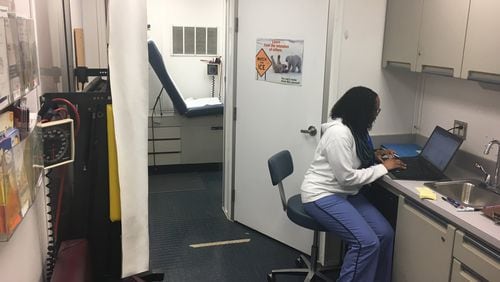With Medicaid under assault in Washington, Georgia’s top community health agency on Thursday approved a program that could more than double the number of school nurses in the state by tapping the federal fund.
In a joint effort with the Georgia Department of Education, the Department of Community Health board voted to approve a nursing services reimbursement program that would draw an estimated $48.6 million in additional federal dollars, assuming no major changes to Medicaid.
There were 1,629 nurses and 307 unlicensed health care and clinic workers in Georgia schools last spring. They are the only medical workers some students see, especially in rural areas where hospitals have closed and doctors are scarce. School nurses provide routine and preventive screenings and examinations, diagnosis of health problems and monitoring and treatment of chronic conditions.
The money is available as a subsidy to schools that provide such care to students who qualify for Medicaid services, generally those from lower-income households.
“Hopefully, this would expand access to health services for more children across the state,” said Garry McGiboney, a Georgia deputy superintendent who worked on the proposal.
This is a matching program for money the state already spends on nurses, about $35 million a year allocated to each school district based on the Quality Basic Education formula. McGiboney described this as a 60-40 match, meaning districts could see more than twice as much in nurse funding if they are willing to abide by the program's regulatory restrictions and paperwork requirements.
The money is conditioned upon approval by the federal government's Centers for Medicare and Medicaid Services, or CMS. The state worked closely with that agency in developing the proposal, so it should come as no surprise to them and McGiboney doesn't anticipate any problems with final approval. "But," he added, "you never know."
The funding could come early in the fall semester though the timing is uncertain. The program goes into effect July 1, or upon approval by CMS. And, said Linda Wiant, the state community health agency administrator handling Medicaid, “Obviously, CMS approval won’t come first.”
The money has been on the table for an unspecified period of time. It came to light last spring when the state education department asked the community health agency if it was accessible by the state. A joint effort to get it ensued.
This request for additional Medicaid dollars comes as lawmakers in Washington discuss cutbacks to the program. None of the state officials involved were willing to speculate about how that might affect the projected revenue stream for Georgia.
Another challenge if the money comes through: finding about 2,000 additional nurses, especially in rural areas, where medical personnel, not to mention teachers, are already difficult to recruit.
In other Education news:
About the Author







